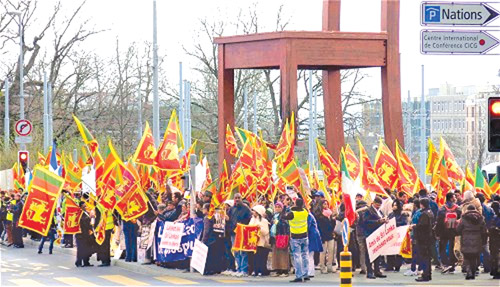|
US Resolution on Sri Lanka:
The good, the bad and the ugh!
by Manjula Fernando
The US Resolution co-sponsored by Sri Lanka and adopted by a
consensus at the UN Human Rights Council's 30th session last week, has
been given different colours and hues by various stakeholders and
critics of the Government.
 |
|
Expatriate Sri Lankans
stage a massive demo in Geneva, urging the UNHRC not to
undermine domestic efforts for reconciliation. Pic:
Colombopage |
While former Sri Lanka's Ambassador to Geneva, Tamara Kunanayakam, a
strong critic of Foreign Minister, Mangala Samaraweera and the National
Unity Government, opined the Resolution that was passed without a vote
in Geneva last week served the global interests of the US and is very
much about a system change in all spheres; political, legal, security
and defence in Colombo to fall in line with President Barack Obama's
2015 National Security Strategy, many viewed it in a different light.
Deputy Chief Minister of Penang Dr. P. Ramasamy, an open champion of
the LTTE cause for a separate state for Tamils in Sri Lanka, wrote in
Malaysiakini, "Many believe that the draft paper tabled by the US would
render null and void the powerful recommendations of the UN report on
the human rights crimes committed in Sri Lanka, especially in Tamil
areas without impunity."
The Resolution was also widely criticized by LTTE propaganda outlets
on the claim that Sri Lanka had watered it down from a strongly worded
document, with US wanting to please the new Sri Lankan Government, which
tows a pro-Western stance.
Although the TNA and the Global Tamil Forum were quick to hail the
US-backed Resolution, Tamil parties including pro-LTTE elements in Tamil
Nadu such as Vaiko too condemned the US call to support Sri Lanka's
stand to initiate a domestic probe.
DMK Leader M. Karunanidhi and Tamil Nadu Chief Minister, Jayalalithaa
Jeyaram lambasted the Indian Government for supporting the Resolution
disregarding the Tamil Nadu Assembly Resolution calling for an
international probe to investigate Sri Lanka's war crimes allegations.
Similarly, Callum Macrae, the director of two short films on Sri
Lanka portraying government forces committing excesses, No Fire Zone and
the recent Sri Lanka: The Search for Justice was not too pleased with
the outcome at the HRC.
He said, "Today, the Human Rights Council had the chance to do
something significant about it but fudged with a tortuously negotiated
'consensus' Resolution, supported by Sri Lanka."
On Channel 4, he commented, "Passed without opposition, the
Resolution acknowledged that terrible crimes were committed and called
for a process of truth, justice and reconciliation."
Falling short
"But it fell short of endorsing a clear call by the High Commissioner
for Human Rights, Zeid Ra'ad Al Hussein, for the creation of a special
hybrid court, with international judges and prosecutors at its heart, to
try the offences."
President Maithripala Sirisena on his return after attending the
United Nations General Assembly in New York on Friday said Sri Lanka
will not be dragged before the UNHRC on war crimes charges linked to the
2009 war ever again.
He added the Government responded well to its critics that the
Government was making blue- prints to betray those who are hailed as
heroes by the people for ending the decades-long bloody war with the
LTTE.
It is in this light, the the latest Resolution on Sri Lanka should be
viewed. Various players have deemed it on a different note but the most
important thing was the statement President Sirisena made, that the
Resolution was rejected by over 30 LTTE fronts.
He said Sri Lanka would have been in a tighter situation if not for
the change of Government in January this year. The EU fisheries ban and
the withdrawal of the GSP facility on garments were the preamble to
economic sanctions against Sri Lanka.
According to him, the response in March this year by the High
Commissioner for Human Rights to defer the war crimes report on Sri
Lanka by six months was the first silver lining in a grey sky since
2012.
Rightful place
Certainly, there has been a lot of work done in the background for
Sri Lanka to redeem its name and re-position itself in its rightful
place in the international community. On September 30, Sri Lanka's
Ambassador in Geneva Ravinatha Aryasingha, after the High Commissioner's
report on Sri Lanka was officially tabled at the sessions said, "We take
note of the Report of the OISL and that we will ensure that its content
as well as recommendations receive due attention of the relevant
authorities including the new mechanisms that are envisaged to be set
up." His statement did not offer any undue undertakings by the Sri
Lanka's Government. Earlier, at the informal meeting on Sri Lanka,
convened at the HRC headquarters to reach a consensus on the US
Resolution, Aryasingha guided by Colombo, protested against certain
paragraphs and wording on the draft.
"...my delegation is of the view that a lengthy Resolution of the
nature of the current draft before us which contains, 24 preambular
paras and 26 operative paras, which is repetitive, judgmental and
prescriptive, is not in keeping with the spirit of the process of
reconciliation and reform that is under way in my country..."
As a result of his intervention and the support by friendly nations,
the initial draft, which carried 24 preambular paras and 26 operative
paras was tweaked and cut down to 23 and 20 respectively in the final
draft that was moved at the Council on October 1.
As Ms.Kunanayakam said, "In a US-dominated world, 'country-specific'
Resolutions are a 'soft power' weapon to promote the strategic interests
of its author, not anybody's human rights." Sri Lanka seems to have
received an extension of service or a second chance to prove its
diplomatic prowess. It is up to the leaders to make good use of it in
the months to come. |

